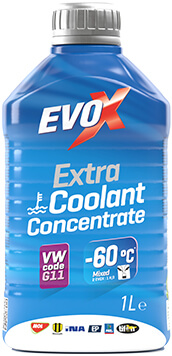EVOX Extra concentrate

coolant concentrate
EVOX Extra concentrate is a monoethylene-glycol based coolant concentrate, produced with an OAT silicate hybrid additive system. It is free from nitrites, amines, phosphates, and is suitable for filling the cooling systems of internal combustion engines. The EVOX Extra antifreeze coolant concentrate must be diluted with water prior to use! It is compatible with hard water, and can be mixed even with tap water* with a suitable mixing ratio, so that the solution has a concentration of 33-55 % (V/V). It cannot be used without being diluted! *Use clean, not too hard water for preparing the coolant liquid. Do not use mining effluents, sea water, saline water, semi-saline water or industrial waste water. Make sure that the water parameters do not exceed the following limit values: Water hardness: 0- 20°nK (0 - 3.6 mmol/l) Chloride content: max. 100 ppm Sulphate content: max. 100 ppm If the water parameters exceed these values, then treat the water with an appropriate method, for example by adding clean distilled or deionised water to it, so that the chloride and/or sulphate levels are reduced below the specified limit values. Although EVOX Extra concentrate is compatible with most other ethylene glycol based coolants, exclusive use of it is recommended for maximum corrosion protection. Most of the coolant liquids are carefully balanced blends of various corrosion inhibitors. Mixing of coolant liquids containing different corrosion inhibitors could reduce the corrosion protection effect. Our operating tests indicate that EVOX Extra concentrate can be used in the cooling systems of high performance Caterpillar diesel engines without any problems. Dilution data:
Applications
- Cooling sytems of passenger and commercial vehicles, agricultural and construction machines and stationary gas engines
- Cooling systems containing cast iron, aluminium and copper parts
| Product features | Benefits |
|---|---|
| Good corrosion protection |
|
| Application specific composition |
|
| Compatible with construction materials |
|
Data sheets
Performance levels, approvals
BS 6580:2010 ASTM D 3306 ASTM D 4985 ASTM D 4656 AFNOR R-15-601 VW/Audi/Seat/Skoda TL 774-C (VW code G11) Ford ESD-M97B49-A MAN 324 Typ NF MTU MTL 5048 Caterpillar / Perkins Chrysler MS-7170 Fiat 9.55523 IVECO 18-1830 Case JIC-501 Deutz DQC CA-14 BMW GS 94000 Cummins 85T8-2 Opel-GM GME L1301 Volvo Construction 128 6083/002 Volvo Trucks 128 6083/002 |
Typical properties
| Appearance | blue |
|---|---|
| Density at 15°C [g/cm3] | 1,130 |
| Flash point (Cleveland) [°C] | 128 |
| pH value | 7,2 |
| Refractive index at 20 °C | 1,4338 |
| Freezing point (1:2 distilled water) [°C] | -19 |
| Boiling point [°C] | 174 |
| Water content (KF) [mass %] | 3,0 |
| Alkalinity [ml 0,1M HCl/10 ml] | 17,5 |




















